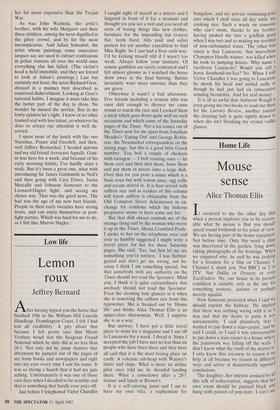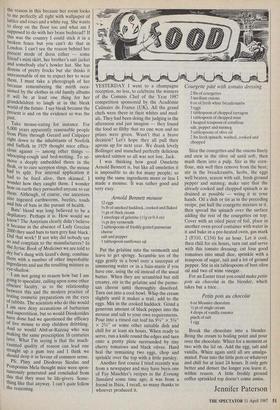Home Life
Mouse sense
Alice Thomas Ellis
Now Someone protested when I said we should repaint the hallway. He implied that there was nothing wrong with it as It was and that my desire to paint it was unreasonable. I said plaintively that I wanted to put down a stair-carpet, and he said I could, so I said it was unreasonable to put down a stair-carpet in a house where the paintwork was falling off the walls.. I don't know what the truth of the matter IS I only know that recourse to reason is n° help at all because we reason in different ways and arrive at diametrically opposed conclusions. The daughter, her interest aroused by all this talk of redecoration, suggests that her own room should be painted black and hung with posters of pop-stars. I can't see the reason in this because her room looks to me perfectly all right with wallpaper of lattice and roses and a white rug. She wants to sleep on the floor too and what am I supposed to do with her brass bedstead? If this was the country I could stick it in a broken fence but you can't do that in London. I can't see the reason behind her present mode of dress either — some friend's mini skirt, her brother's suit jacket and somebody else's bowler hat. She has dozens of pretty frocks but she thinks it unreasonable of me to expect her to wear them. I must take a photograph of her because remembering the mirth occa- sioned by the clothes in old family albums it will be at least one thing for her grandchildren to laugh at in the bleak world of the future. I say bleak because the present is and on the evidence so was the Past.
Take mouse-eating for instance. For 6,000 years apparently reasonable people from Pliny through Gerard and Culpeper right down to the inhabitants of Norfolk and Suffolk in 1929 thought mice effica- cious against — among other things whooping-cough and bed-wetting. To re- move a deeply embedded thorn in the flesh, or to cure scorpion stings, the mouse had to split. For internal application it had to be fried alive, then skinned. I wonder how they caught them. I wonder how on earth they persuaded anyone to eat them. Although, of course, our ancestors also ingested earthworms, beetles, toads and bits of bats in the pursuit of health. Bats' blood was long believed to be a depilatory. Perhaps it is. How would we know? The Assyrians clearly didn't believe it because in the absence of Lady Grecian 2000 they used bats to turn grey hair black. Did that work? If not why did nobody say so and complain to the manufacturers? In the Syriac Book of Medicines we are told to dry bat's dung with lizard's dung, combine them with a number of other improbable ingredients and use the resulting mixture as eye-shadoW.
I am not going to reason how but I am going to speculate, calling upon some other Obscure faculty, as to the relationship between this and the modern practice of testing cosmetic preparations on the eyes of rabbits. The scientists who do this would I am sure deny accusations of barbarism and superstition, but so would Dioskorides have done had we questioned the efficacy of live mouse to stop children dribbling. And so would Abd-ar-Razzaq who was making the same prescription 16 centuries later. What I'm saying is that the much- vaunted quality of reason can lead one straight up a gum tree and I think we Should drop it in favour of common sense. PS: Pliny and Diodorus Siculus and Pomponius Mela thought mice were spon- taneously generated and concluded from this that they must be life-givers. Some- thing like that anyway. I can't quite follow the reasoning.

























































 Previous page
Previous page